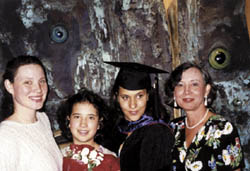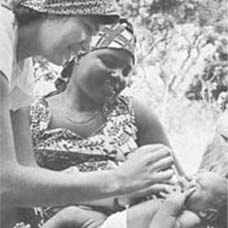
Chile RPCV Juana Bordas founded Mi Casa Resource Center for Women in Denver, Co., and now heads Mestiza and several successful non-profit programs.
Leading Others to Lead
Juana Bordas has dedicated her career to creating a nation of Latina leaders
Caption: Juana Bordas (far right) with her daughters (from left) Carmen, Paloma and Chela.
The Mestiza Leadership Institute in Boulder, Co., has made a name for itself since its inception in 1995 as the consulting firm to turn to for tapping into the benefits of multicultural leadership. Behind it all is an exceptional woman who learned at an early age that servant leadership, a lifetime dedicated to helping and giving back to the community, was her calling in life.
Juana Bordas has taken many turns in her professional life. She was a Peace Corps volunteer in Chile, founded Mi Casa Resource Center for Women in Denver, Co., and now heads Mestiza and several successful non-profit programs. Her ambition and passion were borne out of her experience as the daughter of immigrants, which marked her as different from her peers. Even at a young age, Bordas realized the importance of being part of a collaborative, supportive group.
“I had a real inferiority complex as a child. My parents spoke broken English, we were poor, I was small and dark — a lot of things were going on,” recalls Bordas, whose parents immigrated to Florida from Nicaragua before she was born. “The thing that was an anchor for me was that even as a young girl I understood that girls help each other. For everyone, there’s a network of people that support you and surround you.”
Bordas has dedicated her career to creating a network of Latinos reaching into the highest echelons of corporate America. She has been at the forefront of diversity leadership issues since she became the first Latina faculty member at the Center for Creative Leadership, an elite center for training top-notch executives; it was that experience that inspired her to create a consulting center geared specifically toward the needs of the Latino communities.
“I got the idea that what we needed in our community was the training, because the real missing piece in that top level of trained leaders is the Latino piece,” she says.
Bordas went on to make her mark as the founding president and CEO of the National Hispana Leadership Institute, now located in Arlington, Va., and then founded Mestiza Leadership International in 1995. Mestiza, the Spanish word for people of Native American and European heritage, seemed a perfect name for Bordas’ new endeavor, which specializes in training and developing a work environment that encourages diversity and effective leadership.
“[Mestiza] signifies that Latinos are mixtures, and that we are so diverse that we can become a model for the whole world,” she says. “Sometimes people don’t understand what the word means, but it doesn’t bother me because I’m working for posterity here!”
Bordas’ vision of her legacy led her to create her non-profit venture, the Institute for Mestiza Leadership, three years ago. Under the umbrella of the Institute, Bordas created a training program called the Circle of Latina Leadership. Approximately 70 women between the ages of 22 and 45 have been through the program to date. It has been so successful that Bordas created another program, Compañeras, a community-oriented extension of the Circle. In Compañeras, women who’ve been trained in the Circle give back to the community by mentoring 12-year-old girls. Bordas dreams that these young women will grow up to become Latina leaders in their own right and, in turn, to become compañeras (companions) and mentors themselves.
Compañeras also features a distinctly Latina twist: The young women being mentored are invited into the mentors’ homes, and the mentor is invited into the mentoring subject’s home. “Part of our view is the thought that our advancement is pretty empty if it doesn’t involve la familia, the family,” Bordas says. “We believe that our young people need to know their roots, their mentors, the ones who have passed on before us.”
Bordas seems to be in her element when she’s multitasking and juggling her considerable roster of programs, the publishing of her first book, her speaking tours, and life as a mother to three adult daughters: Chela, a lawyer; Carmen, a bilingual teacher; and Paloma, a student.
Bordas’ first book is tentatively entitled “The Tribe of Many Colors: Leadership for American Democracy,” and could be published as soon as the spring of 2005. It tackles the integration of the leadership practices of people of color within the American democracy.
“Leadership is moving toward collective, or team-based, leadership, or reciprocal leadership,” Bordas said. “So my book takes a look at the different dynamics in each community [of color], examines how they lead, and presents the thesis that until we integrate the practices of all our people into democracy and into organizational structures, one cannot have democracy.”
Another of Bordas’ projects is the Latino Leadership Development Program, a five-day intensive training session she founded in 2002 through Mestiza Leadership International. The program has been tailored expressly for Latinos at the executive level.
“What we teach you is: How do Latinos approach corporations to sell our endeavors? How do we market ourselves? Where is the great Latino advantage? What is it we have to offer?” she says. “We have to develop leaders that are very strategic and that have to promote change. We have to promote leaders with corazón.”
Tapping into the Latino advantage, Bordas says, strengthens the Latino network at the top and creates a greater network of mentors.
If Latinas cannot tap into a network, Bordas counsels them to set up the network on their own and abolish the stereotype of the old boys’ network as the prototype for the mentoring system. “For a young Latina that doesn’t have a mentor, I say, ask someone!” she urges. “Don’t forget that even the people around you, your peers, your comadres, are possible mentors. We get this idea that a mentor has to be a certain type of person, and they don’t.”
Bordas’ uplifting vision and her devotion to the Latina community earned her an induction into the Colorado Women’s Hall of Fame in 1997, a Wise Woman Award from the National Center for Women’s Policy Studies and the Franklin Miller Award from the United States Peace Corps. Bordas has a reputation as the person to turn to for countless corporations interested in maximizing the strengths of a diverse workforce.
“Latinas are starting businesses faster, getting into Congress and politics overall faster, and have so many qualities that are attractive to the dominant culture,” Bordas says. “The groundwork really has been laid. The opportunities are pretty wide open today, although there’s still a lot of bias and a lot that we have to do.”
Bordas’ vision for the future is one that will forever involve her devoting her time and energy to her ideal of servant leadership.
“I believe I’m going to do my best work in my ’80s! The thing I take away is that to be involved and to help people is very joyous,” she says. “It’s fun! I have such a hard time understanding why people don’t get involved.”
by Sirena J. Scales
[This article has been edited for www.latinastyle.com. For the full version, check out the May/June issue of LATINA Style.]








